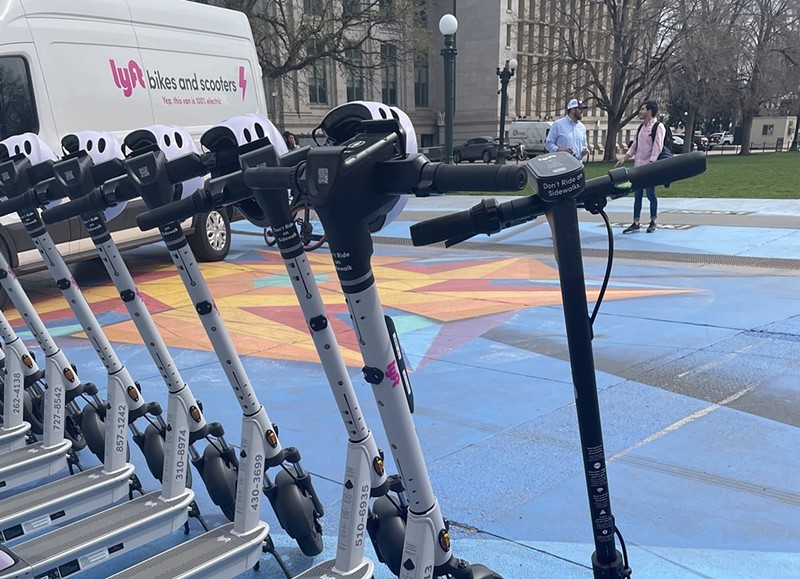One of the two companies that provide rentable electric scooters and bikes in Denver is doing away with standalone dockless vehicles.
Lyft will no longer operate dockless bikes and scooters, the company announced on Wednesday, September 4. Lyft did not detail what will replace the freestanding vehicles, though it could turn to a system where scooters must be picked up and returned at designated docking stations, similar to its Citi Bike operation in New York City.
The move is part of a larger restructuring effort to cut costs, Reuters reported.
"We are discontinuing our dockless scooters in Washington, D.C., and are exploring alternatives for our dockless bikes and scooters in Denver," Lyft's announcement reads.
What those alternatives will be for Denver is unclear. Representatives of the City Council and the Denver Department of Transportation say Lyft has not contacted them about its move to discontinue dockless scooters. Officials don't know when the changes are coming or what they will entail.
"We have not yet had a discussion with Lyft. We only know right now what the article said," says Nancy Kuhn, spokesperson for the Denver Department of Transportation and Infrastructure. "We're aware that Lyft has stated it is narrowing its product portfolio and will no longer operate standalone dockless bikes and scooters. What that means for Denver has yet to be determined."
Kuhn says the city wants rentable e-scooters to remain available in Denver.
Denver residents have taken over 18.3 million e-scooter trips since the rentable vehicles hit the streets in 2018, according to the city's micromobility dashboard. That averages 9,400 trips per day. Denver's other e-scooter operator, Lime, says the Mile High City is the company's second-biggest market in the nation for scooter use, behind New York City.
"Given the popularity of micromobility in the Mile High City and our interest in alternative transportation, we'd like to ensure that scooters and e-bikes remain a viable travel option for our residents and visitors," Kuhn says. "We have not yet had a discussion on next steps with Lyft, and will work to minimize impacts to users as we chart a path forward."
The upcoming changes to Lyft scooters could serve as an opportunity for the city to re-evaluate how it manages the vehicles. Denver City Council started talks on how to address illegal e-scooter use last month, including cracking down on parked scooters blocking sidewalks, curbs or streets. Designated docking stations could help address that complaint.
Councilman Chris Hinds has been pushing for policy change to address such violations, in addition to reckless rider behavior like riding on sidewalks and riding while intoxicated. This comes as the city grapples with increasingly frequent scooter collisions.
Denver Health registered 1,449 patient encounters attributed to scooter injuries in 2023 — nearly four each day of the year — including duplicates for patients who visited multiple care facilities for the same injury and mobility scooter injuries. Orthopedic injury admissions at Denver Health increased by 540 percent in the two years after e-scooters were introduced in the city, compared to the two years before, according to a 2022 study.
"We continue to receive strong feedback from medical professionals, scooter riders, tourists and District 10 residents that there must be changes to the current system," Hinds says. "All of our planning documents call for a broad and inviting pedestrian experience, yet we hear time and time again that many feel scooter rider and scooter litter impedes that experience."
Hinds isn't hopeful that any changes from Lyft will fix Denver's scooter issues. He is wary of relying on outside companies to provide mobility services, offering as an example the Chariot shuttle service that operated in Denver for only a handful of months before its parent company, Ford, shut it down in 2019.
"I continue to be concerned about using private, for-profit transit companies that cannibalize our governmental transit systems," Hinds says. "Getting around is a right, and it's important that we have government-run transit systems, as they cannot just arbitrarily decide to withdraw from the Denver market."

Audio By Carbonatix
[
{
"name": "Air - MediumRectangle - Inline Content - Mobile Display Size",
"component": "12017618",
"insertPoint": "2",
"requiredCountToDisplay": "2",
"watchElement": ".fdn-content-body",
"astAdList": [
{
"adType": "rectangle",
"displayTargets": "mobile"
}
]
},{
"name": "Editor Picks",
"component": "17242653",
"insertPoint": "4",
"requiredCountToDisplay": "1",
"watchElement": ".fdn-content-body",
"astAdList": [
{
"adType": "rectangle",
"displayTargets": "desktop|tablet"
},{
"adType": "rectangle",
"displayTargets": "desktop|tablet|mobile"
}
]
},{
"name": "Inline Links",
"component": "18838239",
"insertPoint": "8th",
"startingPoint": 8,
"requiredCountToDisplay": "7",
"maxInsertions": 25
},{
"name": "Air - MediumRectangle - Combo - Inline Content",
"component": "17261320",
"insertPoint": "8th",
"startingPoint": 8,
"requiredCountToDisplay": "7",
"maxInsertions": 25,
"watchElement": ".fdn-content-body",
"astAdList": [
{
"adType": "rectangle",
"displayTargets": "desktop|tablet"
},{
"adType": "rectangle",
"displayTargets": "desktop|tablet|mobile"
}
]
},{
"name": "Inline Links",
"component": "18838239",
"insertPoint": "8th",
"startingPoint": 12,
"requiredCountToDisplay": "11",
"maxInsertions": 25
},{
"name": "Air - Leaderboard Tower - Combo - Inline Content",
"component": "17261321",
"insertPoint": "8th",
"startingPoint": 12,
"requiredCountToDisplay": "11",
"maxInsertions": 25,
"watchElement": ".fdn-content-body",
"astAdList": [
{
"adType": "leaderboardInlineContent",
"displayTargets": "desktop|tablet"
},{
"adType": "tower",
"displayTargets": "mobile"
}
]
}
]












